Editorial: The Hidden Paradise, the Hidden Hells
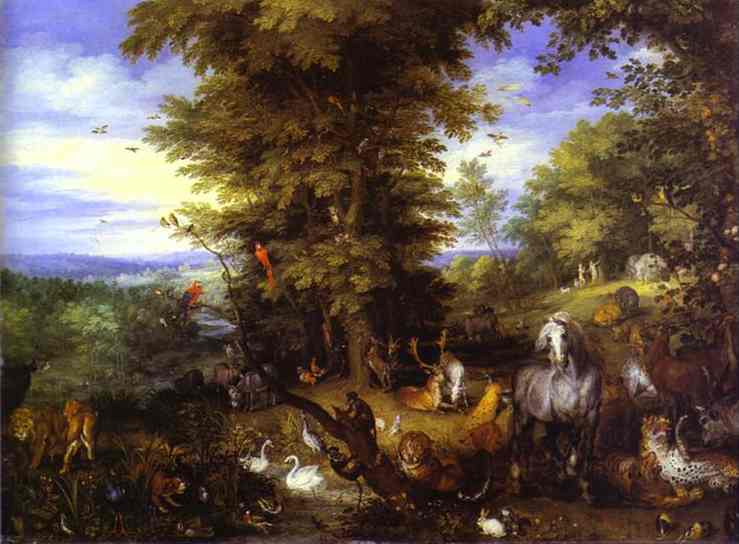
Behind the wild bird's throat
An Eden, more remote
Than Adam knew of, lies--
The primal paradise,
Lost, yet forever here . . . .
Paradise
Readers may recall "The Hidden Paradise," the editorial in the June-July 2008 issue of PT ( see Paradise ). Its thesis was that "paradise" refers not only to a garden of ideal peace and joy at the beginning and end of the biblical saga of history, but also to an ever-present reality largely hidden from our consciousness, coexisting with the world's evil and suffering.
Highlighted in the essay were the following aspects of this Reality:
Unity: Some mystics, as well as German and English romantics of the late eighteenth and early nineteenth centuries, have celebrated a Power that pervades all things, all life, and seeks to draw the separated into "the hidden unity in the Eternal Being."
Beauty and Splendor: Persons in altered states of consciousness have perceived a preternatural beauty in ordinary things. Colors are luminous; "the dust and stones of the street were as precious as gems," says mystic Thomas Traherne of his childhood perception of the world.
Presence: A live transcendent Power, a divine Something or Someone, is present throughout the world. This Presence may be perceived as personal, impersonal, or both.
Harmony with Animals: Some who have been aware of the reality of paradise have felt a deep kinship with nonhuman animals--Francis of Assisi is a well-known example--and act to befriend them.
The Beatrician Vision: In his analysis of the works of Dante, poet-theologian Charles Williams proposes that the person who falls in love perceives, for a a few months or years, the divine glory in her/his beloved. The lover tends to be unaware of the beloved's faults during this period of rapturous lucidity. After this window of vision closes, her/his faults will be all too apparent, and the wonderfulness the lover saw is likely to seem illusory. But it is real, and exists in everyone.
Countless people (and animals?) have fallen in love, and fallen out of it; probably far fewer have experienced the altered states of consciousness in which all things appeared glowing with sublime beauty, or drawn together in kinship or seamless unity. Thus the fullness of this Paradise remains hidden most of the time. But refracted glimpses that offer a touch of happiness, if not a storm of rapture, are readily available to many: in the clear night sky, in blossoming trees, in autumn leaves on the wind, in a strain from Mozart, in the rainbow flashes from a diamond, in the sight of loving animals snuggling together. Though most of the time we may "miss the many-splendored thing," Paradise is not hidden altogether.
The Hells
John Hall Wheelock's poem "Wood-Thrush," whose opening is cited above, describes not only the narrator's mystical-intuitive perception of the presence of paradise when he hears the song of the thrush, but of the presence of the world's evil and anguish as well:
. . . .Troy lost and Hector slain,
Judas and Golgotha,
The longing and the pain,
Sorrows of old that were. . . .
Like Paradise, Earth's many hells, of innocent, guilty, or semi-guilty suffering, are partly hidden. One of the factors that hide them is what also hides Paradise: our limitations as incarnate beings. Of the vast majority we remain simply ignorant. Some make their way into history books or into the news: natural disasters, and disasters triggered by greed; street crime and child abuse; terrorist attacks; wars of aggression. Most of us will wince at the thought of the terrible suffering involved, but the impression usually soon fades, and we turn to something else. Our geographical distance and our differing foci of interest insulate us from the horrors.
There are other insulating factors as well. One is cultural blinkers and blindfolds, which may combine with geographical barriers, or function very effectively by themselves. For example, before the second wave of the women's movement, it was common for women who suffered rape or other abuse to be isolated by a climate of blame for their victimization: "she asked for it." In some subcultures, having been raped may even make them "fair game." Similarly, in the late nineteenth and half of the twentieth century, when the Ku Klux Klan and lynch-law ruled in much of the South, photographers would produce and sell postcards picturing gleeful white mobs surrounding a black figure hanging from a tree. whose crime may have been making a self-assertive remark or flaunting an expensive item of property. Blinded by prejudice, people cannot see a horror that is right before their eyes.
A third factor hiding the hells is secrecy and deceit. Example: a transcontinental corporation that is wrecking the environment in a developing country, and suppressing protests with deadly violence, protects its markets by keeping the story out of the major media at home. Another: an unscrupulous government wins over its people to an aggressive war via fictional stories demonizing the target people, or even by mounting a "false-flag" attack on itself for which it blames the other. Whistle-blowers find their reputations ruined, face prison, or suddenly succumb to mysterious illnesses. Torture centers are set up in secret locations.
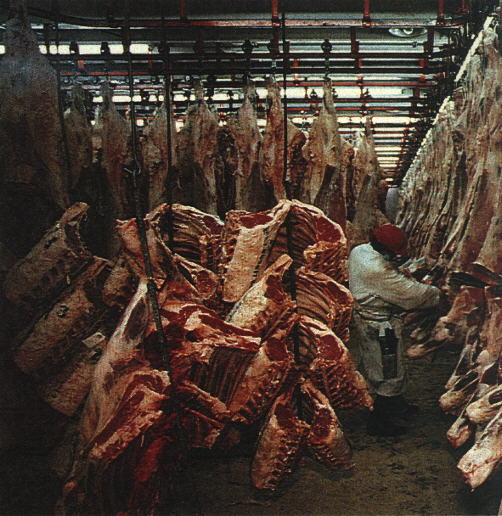
Readers of PT will recognize a number of these factors and tactics at work hiding the animal hells. For decades most people have been ignorant, protected by geographical distance and more. Our very language sets up a whole system of blinkers, beginning with referring to an animal as "it" rather than the obvious she or he, and a whole vocabulary that demeans and depersonalizes animals, making exploiting, killing, and eating them part of The Way Things Are. Deceit and secrecy make an unholy alliance when factory-farms give themselves bucolic names like Clear Run Farms or Happy Valley, but need barbed wire and concrete walls to keep the public from looking in on all that happiness. As a result of footage of horrendous abuse appearing in the media in recent years, several farm states are currently considering laws making undercover photography a felony. Challenged, the powers of this network of hells are trying to consolidate their strength.
Uncovering the hidden hells to public gaze so that they may ultimately be dismantled is a painful and thankless task, and, in parts of the U.S. at least, may soon become more painful still. We continue to support this process nonetheless because we feel a powerful compassion, and because of our faith that its source in Divine Love is more deeply based than the evil rampant in the hells. One of the ways I have expressed this faith is in referring to "the hells" in the plural, and Paradise in the singular. They are pockets, or rather pits, of horror; Paradise, centered on the Hidden Unity in the Eternal Being, is the Center and the Circumference of reality. As we work to disclose and empty these hidden hells, we need to refresh ourselves from time to time by resorting to Paradise, our true home.
--Gracia Fay Ellwood
The painting of Paradise is by Jan Brueghel the Elder, ca. 1620.
Unset Gems
"We cannot die on every cross, nor are we expected to."--Thomas Kelly
"I looked at all the caged animals. . . the cast-offs of human society. I saw in their eyes love and hope, fear and dread, sadness and betrayal. And I was angry. "God," I said, "this is terrible! Why don't you do something?"
God was silent . . . "I have done something . . . I created you." --Jim Willis, 1999
--Contributed by Lorena Mucke
"The strong are the patient ones."--James Clavell
--Contributed by Carl Sheppard
News Notes
British Slaughterhells to Install CCTV
After film footage of nightmarish abuses was released by Animal Aid and published in The Guardian last year, five supermarket chains have been pressuring the abattoirs who supply them with animal flesh to install closed circuit TV. Some of these are expected to be in place by June 2011.
See CCTV Demanded
--Contributed by Marian Hussenbux
Chickens Show Empathy
New studies seem to indicate that chickens are capable of showing empathy or feel another's pain. Researchers were able to observe changes in behavior of hens in response to the distress of their chicks. According to these scientists, "... female birds possess at least one of the essential underpinning attributes of 'empathy', the ability to be affected by, and share, the emotional state of another." See Chicken Empathy
Plans for Monster Dairy Withdrawn
Thanks to year-long opposition by the British Environment Agency and the activist groups Viva! and Vegan Lincs, the application by Nocton Dairies in Lincolnshire, England, to build a 3,700-cow dairy have been withdrawn, at least for the present. See Mega-Dairy
--Contributed by Marian Hussenbux
Hyena Rescue
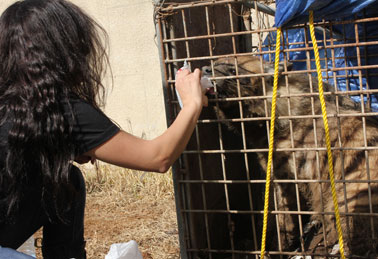
A joint operation between the Ministry of Interior, Ministry of Environment and Animals Lebanon succeeded in rescuing a wild-caught hyena illegally held by a pet shop in Saida, southern Lebanon. May, as she is now called, had a broken jaw; she been kept for four years in a tiny cage, exposed to the elements, forced to sit on a pile of trash that had accumulated in the cage. The police escorted members of Animals Lebanon to the property, and May was taken to safety. See Hyena
--Contributed by Marian Hussenbux
A Glimpse of the Peaceable Kingdom
Goose Befriends Human
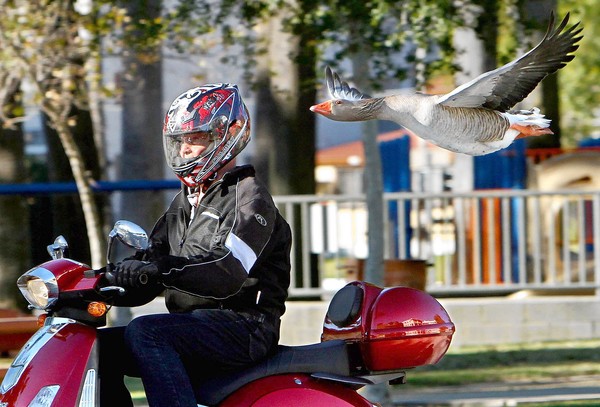
Maria, a greylag goose who hangs out at Echo Park Lake, Los Angeles, has made friends with a retired investor named Dominic Ehrler, who brings tortillas each day for her and the other geese. About an hour later he remounts his red scooter and sets out; the devoted Maria launches into flight and follows him down Echo Park Avenue, to the astonishment of motorists. After a pleasant spin together, he routes her back into the park. See Maria and Dominic
Letter: Gerald Niles
Dear Peaceable Friends,
The following thoughts and memories were stirred upon reading Robert Heckert's editorial, "Friends and the Vegetarian Way."
Many Friends have agricultural and dairy farming backgrounds, and an economic motive for opposing veganism. I spent the summer of 1994 in an Iowa prison, where I requested vegan meals. The prison chaplain, a Mennonite (and a dairy farmer), asked me about the basis of my request. In part, I said, vegetarianism is an expression of Friends' Peace Testimony, of peace toward all sentient beings. He explained that he was kind to his cattle. That's very nice, I replied, but what about the taking of the calves' milk and then slaughtering them for "herd management," veal, and scraping the inner lining of their stomachs for rennet to make cheese?
The chaplain grew red in the face, raised a trembling hand with pointing finger, and decreed "You're no Quaker!" But I found the support of vegan Friends, including an attorney, and was given wholesome vegan meals in that prison.
Upon return to the Florida prison system, because I'd been deemed an "ungracious guest" by Iowa officials, a Florida prison chaplain decided I would "eat meat or starve." The abovementioned Quaker lawyer helped me file a federal suit, and immediately we won the right for all Florida inmates to receive vegan meals. This policy remains in effect in the Florida system to this day. While the vegan offerings are not as varied and tasty as those provided by some other prison systems, they remain the healthiest choice by far.
. . . . I wish I could make that soup and berry crumble in the February-March issue!
Gerald Niles has been in prison since the early 1990s. From time to time he tells of making another effort to get a DNA test to prove his innocence.
Book Review: My Spiritual Journey
My Spiritual Journey - Personal Reflections, Teachings and Talks. By the Dalai Lama . Edited by Sofia Stril-Rever. Translated by Charlotte Mandell. New York: HarperOne, 2011. Hardcover, 284 pages. $25.99.
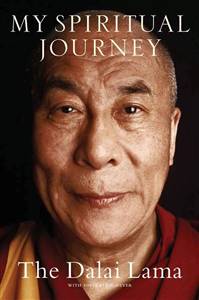 Sofia Stril-Rever, who has faithfully translated these speeches and articles from Tibetan into French, has also annotated them (the notes are printed in italics) and collected them into what amounts, more or less, to an autobiography. The book is divided into three sections: "As a Human Being," "As a Buddhist Monk," and "As the Dalai Lama."
Sofia Stril-Rever, who has faithfully translated these speeches and articles from Tibetan into French, has also annotated them (the notes are printed in italics) and collected them into what amounts, more or less, to an autobiography. The book is divided into three sections: "As a Human Being," "As a Buddhist Monk," and "As the Dalai Lama."
As a human being, Tenzin Gyatso considers every human being his brother or sister, and urges all to do the same (pp 13, 15) He tells the fascinating story of how as a small child he was recognized as the 14th incarnation of the Dalai Lama, and of his early education. On visits to his parents, he would eat eggs and pork, which he was not allowed to eat as the Dalai Lama. (p. 50). Curiously, he does not say whether he still eats them; on this issue one hears conflicting accounts. He certainly does urge others to go vegetarian, but in the past has taken the word of physicians that he needed meat to remedy illness.
In the second section he makes this wise observation: "I believe the purpose of all the major religious traditions is not to construct big temples on the outside, but to create temples of goodness and compassion inside, in our hearts" (page 87). Very true. But temples of compassion cannot be supplied and fed by violence against our animal friends.
The third part deals, by necessity, with the unending efforts of the Dalai Lama to restore some measure of freedom and independence to Tibet. It is very ironic that this nation, with a culture, language and way of life so different from those of China, was declared by the Chinese in 1950 to be an integral part of China; for sixty years they have been working to transform this fiction into a reality. For readers of the Peaceable Table, the most relevant and interesting reading will be the material on the wildlife of Tibet, pp. 139-144. Despite eating pigs, the Tibetans do have a very strong religious and cultural aversion to hunting. As a result, the whole country used to be teeming with wildlife. In his childhood, the Dalai Lama enjoyed observing the Khyungkar (a red-beaked bird), the Trung Trung
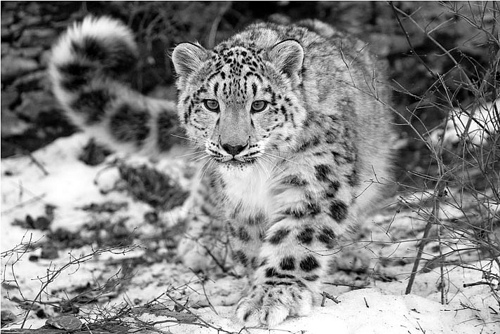 (black-necked cranes), the bears, foxes, wolves, the Sazik (the beautiful snow leopard), the giant panda, the lynx, and others. Unfortunately, many of the Chinese, so different in this as in so many other things from the Tibetans, are enthusiastic hunters, and the local birds and beasts soon learned to flee from them. The Chinese then took to wearing Tibetan clothes -- "flying false colors"--when hunting.
(black-necked cranes), the bears, foxes, wolves, the Sazik (the beautiful snow leopard), the giant panda, the lynx, and others. Unfortunately, many of the Chinese, so different in this as in so many other things from the Tibetans, are enthusiastic hunters, and the local birds and beasts soon learned to flee from them. The Chinese then took to wearing Tibetan clothes -- "flying false colors"--when hunting.
One cannot imagine this deception being effective for long. The animals fled to what remained of the Tibetan forests, which were ruthlessly devastated by Chinese mining and construction interests. If Tibet ever regains its independence and cultural identity, it may become again a wildlife paradise. However, this looks very unlikely. By cruel irony, it is made even more unlikely by the fact that the Tibetan exile community, urged by their leader, has evolved towards a democratically-elected government. Now the economic-military-political machine that is China may be amenable to allowing some degree of autonomy to Tibet-- but not if it means a democratic government for the region. This may happen one day, but it does not seem likely in the foreseeable future. May the day come soon, and may it come peacefully.
Despite the nonviolent ideals of Buddhism, Tibetans have traditionally eaten meat, partly because their cold, mountainous country supplies inadequate vegetation for a completely plant-based diet. So, tragically, they have been unable to follow their ideals. But it is encouraging to know that there is a strong vegetarian movement among exiled Tibetans in India. We can imagine and pray for a day when trade between these emigrants (together with others) and the home country may make it possible for all of them to live without bloodshed. "Blessed are the merciful, for they shall receive mercy."
-Benjamin Urrutia and Gracia Fay Ellwood
Book Review: Quiet in the Garden
Quiet in the Garden. Aliki. (City of publication not given): Greenwillow. Illustrations by Aliki. Hardcover, $17.99. Unpaginated (26 pages). 2009
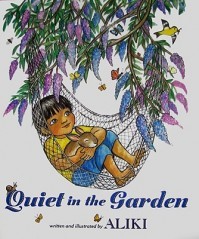 Aliki--full name Aliki Liacouras Brandenberg--is a distinguished creator of children's books, both author and artist. She was born in 1929 in the USA of Greek immigrant parents and now lives with her husband in London.
Aliki--full name Aliki Liacouras Brandenberg--is a distinguished creator of children's books, both author and artist. She was born in 1929 in the USA of Greek immigrant parents and now lives with her husband in London.
In Quiet in the Garden, Aliki has created a story that is simple, peaceful, and magical. A boy with black, silky hair and cinnamon-tan skin steps out of his house into the courtyard garden, planted with both flowers and vegetables; his eyes, his most striking feature, are large and blue, suggesting love and wonder. Dressed in blue denim shorts, a plain white T-shirt, and sandals, he looks like an average Earthling child, who would not attract a second glance anywhere on the planet--unless one gaze into his seemingly miraculous eyes and realize he is no ordinary child, indeed no ordinary human.
In his right hand, he carries a red toy truck, with which he clearly intends to play. But soon there is a change of plans. Instead of noisy running and make-believe, he sits still and listens, as quietly as Jesus at prayer or the Buddha in meditation. He hears and sees a robin nibbling berries, a snail eating leaves, a butterfly sipping nectar from flowers. A worm, a squirrel, a rabbit, a turtle, lizard, a frog, a fish, a mouse, and the rabbit who is the child's companion, all are feeding in their various ways.
Now your average property-oriented human would probably react by trying to drive away the various creatures to stop them from eating his or her flowers and fruit. Our hero has the opposite response: he quickly gathers fruits and vegetables, and invites all the garden's inhabitants to join in a wonderful feast. There is enough for everyone, and all rejoice. This seemingly ordinary place has become the Garden of God once more. (Admittedly, people who depend on their gardens to feed themselves must take action about small competitors. Some peaceable gardeners have been known to set extra plants outside the fence for furry neighbors.)
The book is joyfully recommended for girls and boys with a potential for gentleness and quiet, and for grownups who love animals and gardens, and have not given up on paradise. I hope readers of PT will enjoy this book over and over again, as I have, and will give a copy to their children, nephews and nieces, or grandchildren.
--Benjamin Urrutia
Recipes
Carrot Ginger Dressing
makes about 2 cups dressing
6 medium size organic carrots, peeled
1 medium organic yellow or sweet onion, chopped
1 clove organic garlic, chopped
2 inch piece fresh organic ginger, peeled and grated
½ cup safflower OR canola oil
½ cup unseasoned rice vinegar
1 T. tamari
¼ - ½ tsp. sea salt, (to taste)
1 T. tomato paste
2 T. water
Place all ingredients in the bowl of a food processor; process until smooth. If mixture seems too thick, add a little more water to obtain desired consistency. The dressing, however, should be fairly thick.
This dressing is delicious on a salad of Romaine lettuce and other hearty greens, sprinkled with lightly toasted sunflower seeds. This recipe may easily be made gluten-free, if a gluten free soy sauce is substituted for the tamari.
Gluten Free Fennel Cake
makes one 9 inch cake
⅓ cup safflower OR canola oil
1 cup blanched almonds
¾ cup evaporated cane juice (organic sugar)
1 tsp. baking powder
1 T . fennel seeds
1 cup organic chickpea flour
2 T. brown rice flour
¼ cup cornstarch
¾ tsp. sea salt
1 cup vanilla flavored soy milk
2 T. brandy
Preheat oven 350°F. Spray 9 inch spring form cake pan with non-stick cooking spray.
In the bowl of food processor, process almonds, safflower oil, organic sugar, baking powder, and fennel seeds. Process until well mixed. Add chickpea flour, cornstarch, brown flour and sea salt; process to mix well. Add soy milk and brandy; process until smooth. Pour into cake pan. Bake about 60 minutes (one hour) or until toothpick comes out clean. Remove from oven and let cool completely on a wire rack. Remove from cake pan and serve at room temperature.
Cakes flavored with herbs such as fennel, thyme or rosemary originated in Tuscany.
This is a uniquely different cake that is best served as a mid-morning or mid-afternoon rather than a meal end dessert. The gluten free version of the fennel cake is quite moist and delicious.
-- Angela Suarez
Pioneer: John Oswald, 1730-1793
A Scotsman from Edinburgh, John Oswald enlisted in the English army and was sent to the East Indies. Thanks to his courage he was made an officer, but he resigned from the military and traveled in India to study Hinduism and Buddhism. He became passionately devoted to vegetarianism, but not to pacifism; he gave his life fighting in the French Revolution. His book Cry of Nature: an Appeal to Mercy and to Justice on behalf of the Persecuted Animals expresses an awareness both of paradisal beauty and innocence, and his outrage at human cruelty and violence. The drawing, taken from the book, shows a mother animal looking at her slaughtered infant.
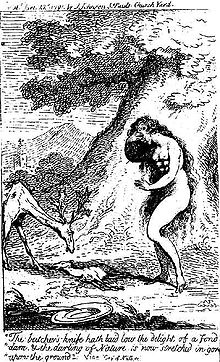 . . . . Shall we leave the living herbs to seek, in the den of death, an obscene aliment? Insensible to the blooming beauties of Pomona--unallured by the fragrant odours that exhale from her groves of golden fruits . . . the ambrosia of innocence--shall the voracious vultures of our impure appetites . . . devour the remains of other creatures . . . ?
. . . . Shall we leave the living herbs to seek, in the den of death, an obscene aliment? Insensible to the blooming beauties of Pomona--unallured by the fragrant odours that exhale from her groves of golden fruits . . . the ambrosia of innocence--shall the voracious vultures of our impure appetites . . . devour the remains of other creatures . . . ?
. . . . They feed on the carcass without remorse, because the dying struggles of the butchered victim are secluded from their sight . . . because his agonising shrieks sink not into their souls. But were they forced, with their own hands, to assassinate the beings whom they devour, who is there among us who would not throw down the knife with detestation, and, rather than imbrue his hands in the murder of the lamb, consent for ever to forgo the accustomed repast . . . .
--Quoted in The Heretic's Feast by Colin Spencer, p. 235
Poetry: Dorothy Leigh Sayers, 1893-1957
Untitled
Here then at home, by no more storms distrest,
Folding laborious hands we sit, wings furled;
Here in close perfume lies the rose-leaf curled,
Here the sun stands and knows not east nor west,
Here no tides run; we have come, last and best,
From the wide zone through dizzying circles hurled
To that still center where the spinning world
Sleeps on its axis: to the heart of rest.
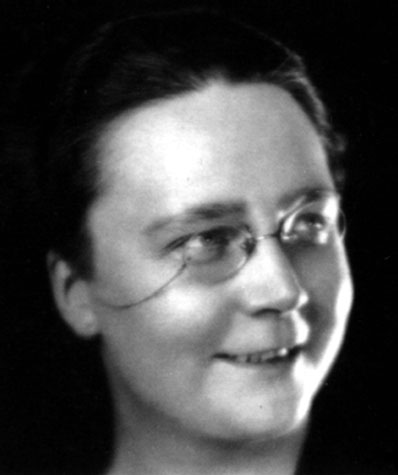 Lay on thy whips, O Love, that we upright,
Lay on thy whips, O Love, that we upright,
Poised on the perilous point, in no lax bed
May sleep, as tension at the verberant core
Of music sleeps; for if thou fail to smite
Staggering, we stoop; stooping, fall dumb and dead
And, dying so, sleep our sweet sleep no more.
This sonnet, from Sayers' 1935 mystery novel Gaudy Night, is presented as the joint work of the main characters, Harriet Vane (octet) and Lord Peter Wimsey (sestet). In the sestet the spinning planet has become a child's top, which in one earlier form was kept in motion by a whip.
The Peaceable Table is
a project of Quaker Animal Kinship / Animal Kinship Committee of Orange Grove Friends Meeting, Pasadena, California. It is intended to resume the witness of that excellent vehicle of the Friends
Vegetarian Society of North America, The Friendly
Vegetarian, which appeared quarterly between 1982 and
1995. Following its example, and sometimes borrowing from its
treasures, we publish articles for toe-in-the-water
vegetarians as well as long-term ones.
The journal is intended to be
interactive; contributions, including illustrations, are
invited for the next issue. Deadline for the May issue
will be April 25, 2011. Send to graciafay@gmail.com
or 10 Krotona Hill, Ojai, CA 93023. We operate primarily
online in order to conserve trees and labor, but hard copy
is available for interested persons who are not online.
The latter are asked, if their funds permit, to donate $12 (USD) per year. Other
donations to offset the cost of the domain name and server are welcome.
Website: www.vegetarianfriends.net
Editor: Gracia Fay Ellwood
Book and Film Reviewers: Benjamin Urrutia & Robert Ellwood
Recipe Editor: Angela Suarez
NewsNotes Editors: Lorena Mucke and Marian Hussenbux
Technical Architect: Richard Scott Lancelot Ellwood

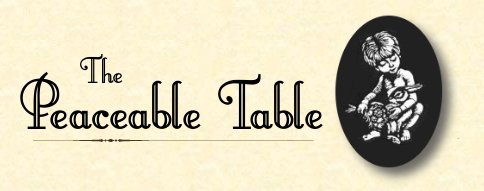


 Sofia Stril-Rever, who has faithfully translated these speeches and articles from Tibetan into French, has also annotated them (the notes are printed in italics) and collected them into what amounts, more or less, to an autobiography. The book is divided into three sections: "As a Human Being," "As a Buddhist Monk," and "As the Dalai Lama."
Sofia Stril-Rever, who has faithfully translated these speeches and articles from Tibetan into French, has also annotated them (the notes are printed in italics) and collected them into what amounts, more or less, to an autobiography. The book is divided into three sections: "As a Human Being," "As a Buddhist Monk," and "As the Dalai Lama." (black-necked cranes), the bears, foxes, wolves, the Sazik (the beautiful snow leopard), the giant panda, the lynx, and others. Unfortunately, many of the Chinese, so different in this as in so many other things from the Tibetans, are enthusiastic hunters, and the local birds and beasts soon learned to flee from them. The Chinese then took to wearing Tibetan clothes -- "flying false colors"--when hunting.
(black-necked cranes), the bears, foxes, wolves, the Sazik (the beautiful snow leopard), the giant panda, the lynx, and others. Unfortunately, many of the Chinese, so different in this as in so many other things from the Tibetans, are enthusiastic hunters, and the local birds and beasts soon learned to flee from them. The Chinese then took to wearing Tibetan clothes -- "flying false colors"--when hunting. . . . . Shall we leave the living herbs to seek, in the den of death, an obscene aliment? Insensible to the blooming beauties of Pomona--unallured by the fragrant odours that exhale from her groves of golden fruits . . . the ambrosia of innocence--shall the voracious vultures of our impure appetites . . . devour the remains of other creatures . . . ?
. . . . Shall we leave the living herbs to seek, in the den of death, an obscene aliment? Insensible to the blooming beauties of Pomona--unallured by the fragrant odours that exhale from her groves of golden fruits . . . the ambrosia of innocence--shall the voracious vultures of our impure appetites . . . devour the remains of other creatures . . . ?  Lay on thy whips, O Love, that we upright,
Lay on thy whips, O Love, that we upright,